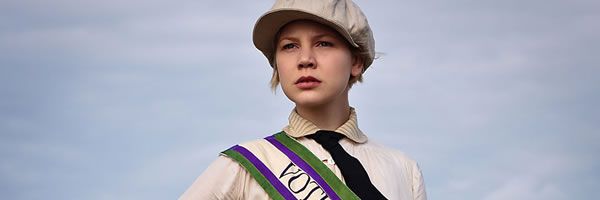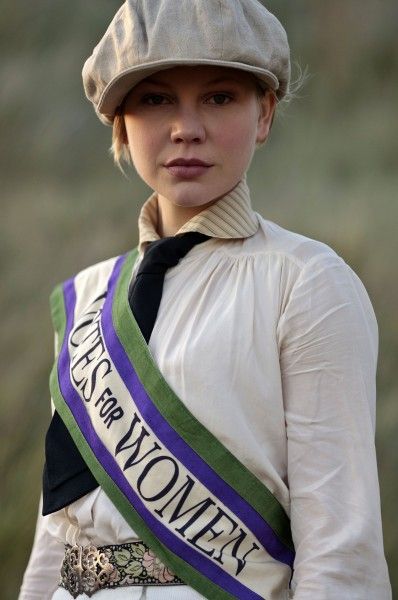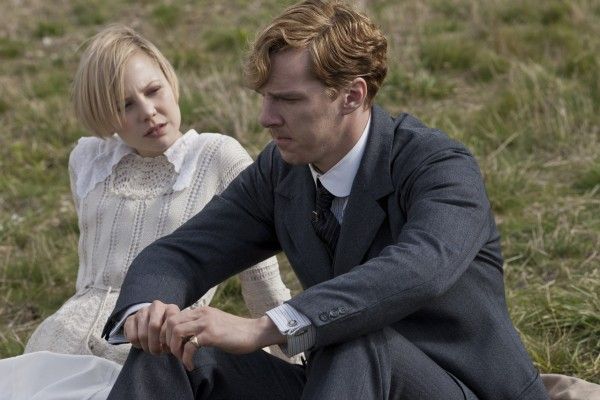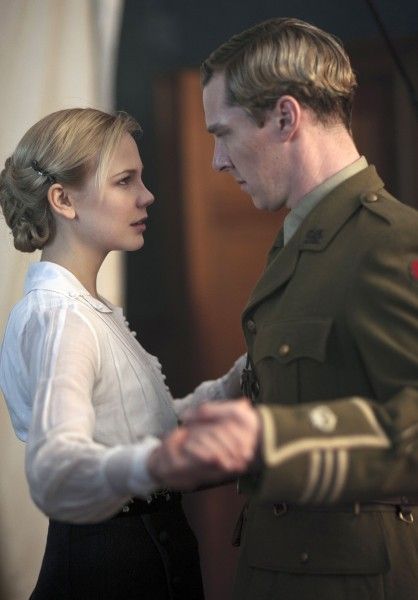Set against a backdrop of impending catastrophe in the early 20th century, the five-part mini-series Parade’s End (airing on HBO from February 26th through 28th) tells the story of English aristocrat Christopher Tietjens (Benedict Cumberbatch), who is trapped in a marriage to an unfaithful wife while being torn over his unspoken love for a fearless, young suffragette. Sylvia (Rebecca Hall) is a callous socialite who has given birth to a child that may not be his while Valentine Wannop (Adelaide Clemens) is a fearless young woman who unexpectedly turns Christopher’s world upside down. As the First World War breaks out across Europe, Christopher struggles to adapt to his new life as an army officer and attempts to hold onto sanity and meaning, as the old world order collapses amidst tremendous upheaval, marking the end of Edwardian ideals and bridging the gap between feudal England and the dawn of modernism.
During this recent exclusive interview with Collider, actress Adelaide Clemens talked about why she wanted to be a part of Parade’s End, how exciting it was to play such a multi-faceted and complicated character, that she was nervous about taking on such a classic British story, and how inspiring Benedict Cumberbatch was to work with. She also talked about the experience of playing Catherine in writer/director Baz Luhrmann’s The Great Gatsby, and her role on the Sundance Channel original series Rectify, about a man returning home after spending 19 years on Death Row. Check out what she had to say after the jump.
How did this come about for you?
ADELAIDE CLEMENS: I was given the script by my agent, and it was just very clear, from the first read, that this was going to be a phenomenal project. I’m a big fan of Tom Stoppard’s work, and have been since I was in school where I studied him. I also had the feeling, probably for the first time in my career, that Valentine was a role that I was capable of doing and would be a really incredible character to play. She’s so vibrant, even off the page, and quirky and brilliant-minded. It was also really daunting. Even talking about it now, it’s still quite daunting. It’s such an important piece of English literature, and I played this iconic role in the series, but I was so happy to do it.
Are you typically the kind of person who, when you see a role you want, you pursue it and don’t take no for an answer, or was this an unusual circumstance for you?
CLEMENS: I’m not typically like that, no. I’m very analytical about the industry and I understand that there are value systems, and all sorts of things like that. But, the roles in this project, Rectify and even The Great Gatsby flicked a switch on with me, and I was completely determined to figure out how to get them.
Was it exciting to be a part of a project with such multi-faceted and complicated female characters?
CLEMENS: Yeah! I really believe Rebecca Hall’s performance is absolutely stand-out. I personally think she’s just phenomenal (as Sylvia). It’s so interesting, watching it back, because when you’re in it, you’re so absorbed with your character and really want to pay attention to the history and the political references. We’re honoring Ford Maddox Ford’s and Tom Stoppard’s creations. Looking back on it now, it’s funny because I see the journey that Valentine goes on. She starts out with this almost naive, wild belief that she is going to change the world, for the rights of women. And then, what’s so interesting is that she hasn’t even gone through womanhood, in a way. In some ways, she doesn’t even know what it is to be a woman, and maybe Sylvia does more. It tosses up a lot of questions about a woman’s role, and about what it is that we want out of life, and also how women today take the situations that we have for granted. We would not be here, if it wasn’t for the suffragette movement, which did get very aggressive, but was so imperative to us being here, right now.
How would you describe Valentine?
CLEMENS: I just saw her as fiercely intelligent and incredibly selfless. Her background is that she worked as a dishwasher in a house with a drunken cook. She did that because her father had died, and he was a literary professor who was an incredibly intelligent man, and her mother is a single woman, who is also a fascinating character, played by Miranda Richardson, that went off to be a critic. Both the women in the family work, in order to make sure that Edward, the son, can go to university, and that is so amazing. Even today, a lot of people in society fall into this thing where men are still seen as the providers, whereas these two women in 1910 were providing for the man. I think it’s fascinating. I could talk and talk about it.
Were you nervous about taking on such a British story, as an Australian? Did you do a lot of extra research to make sure you got it right?
CLEMENS: Yeah, I was nervous about it. I just really wanted to make sure that I gave it the respect and honored the project, as much as I possibly could, and I did that by trying to understand, as much as I possibly could, about the time and about England. I had the flora and fauna encyclopedia of the English countryside on my beside table. I had maps of England, all over my apartment. I try to do as much research for every role that I can possibly do.
What do you think it is that draws Christopher to Valentine?
CLEMENS: I think he’s so noble and he has the most incredible integrity for a man of that time. They were both really looking at the world and making that bold step of not agreeing with it. They’re being so bold as to challenge it and question whether or not the way that technology was advancing, and whether all these social niceties and statuses were really necessary or whether they’re just clinging to them because everyone else was. It’s the classic case of opposites attract. He’s harkening back to this old world of the Tories, and she’s looking forward to democracy and equal rights for women. We naturally all want to conform. Integrity is the really important word to use in describing him because he has eccentric values to his peers, and he just stands by them and explores them. It’s such an admirable thing for any person to watch, even today. I look at Christopher and I’m like, “I want to meet a Christopher! I want a Christopher!” I think Valentine falls in love with that. It’s also just that indescribable love.
What was it like to have someone like Benedict Cumberbatch to play these scenes off of?
CLEMENS: He brings so much to everything he does. He’s incredibly hard-working and fiercely intelligent. He’s so inspiring to be around, and so passionate about what he does. That energy on set fueled us all. He really just led the whole team on Parade’s End.
What was it like to leave this set and go do The Great Gatsby, before going back to finish Parade’s End?
CLEMENS: It was perfect! It was really wonderful. It was a really weird experience, historically speaking, and the insight that I got. I couldn’t show my wrists and ankles in Parade’s End, and then I was flung into The Great Gatsby, where I was standing on tables. It was the 1920's, which is such a wild period in time.
How was it to work with such a visual artist as Baz Luhrmann?
CLEMENS: He’s so brilliant. It was such an exciting project. I’m really excited to see it!
What attracted you to Rectify?
CLEMENS: It was such a contrast to anything I had ever played, and a state of mind that I really was fascinated by. Tawney is almost the complete opposite of Valentine. She believes in being the woman of the household, and marrying and settling down and fulfilling the woman’s role, in the very traditional sense. She’s a Southern Christian woman. But, what I also loved was that she was not the stereotype of a Christian character, which I’ve seen many of, in film and television. I really liked making her very multi-faceted and allowing the audience to change their opinion and awaken them to Christianity in a very different light. She’s naive, but she’s not unwise. She has a lot of inherent wisdom and intuition, and I love that about her. I love that she’s almost like a child, in that she walks up to this man and has a conversation with him, just as any child would. I’m really excited about Rectify. It’s going to be a really great season. Tawney’s journey throughout the series is fascinating. I’m really excited to see what people think. It’s quite frightening, in a way, and it’s really completely unexpected. You’d get people walking onto the set completely silent because of the turns in the script. It’s going to be a really interesting series.
As an actor, do you enjoy getting the opportunity to explore a character over a longer period of time?
CLEMENS: I really do. I’ve done a lot of independent film, which are short shoots that are usually four to six weeks, max. I enjoy everything. After one particular experience of work, I like to go in the opposite direction and do a short film, or something else. I’ve just been in London, trying to pursue theater. I’ll look for anything that’s different, just to keep shaking it up. With Parade’s End, playing Valentine for that period of time and getting to play such an incredible character, was a dream. It was amazing how much you can learn about someone, and that learning process never stops. I just think it’s a never-ending process. It’s nice to keep yourself inspired, in that way. I actually really liked not knowing where things were going with Rectify because it’s very lifelike. We don’t know what’s going to happen tomorrow. Sometimes we look back and, even when we know what we’ve done with our lives, we can’t believe the decisions that we’ve made. I can’t believe how bold and bombastic I was about pursuing Valentine. You never know what’s going to happen next.
Parade’s End airs on HBO from February 26th through 28th.




